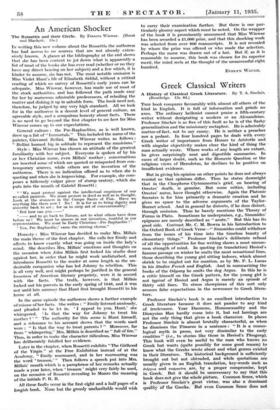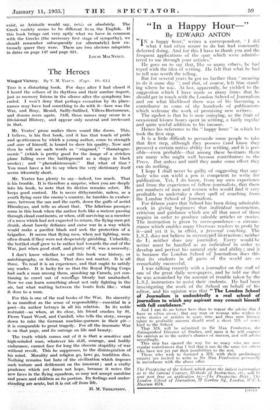Greek Classical Writers
A History of Classical Greek Literature. By T. A. Sinclair. (Routledge. 12s. 6d.)
Tins book compares favourably with almost all others of the kind in English. It is full of information and grinds no axes. The ordinary hellenist cannot praise a fifth-century writer without denigrating a modern or an Alexandrian. Professor Sinclair is as free of this fault as he is of the flashy generalization and the missionary metaphor. He is admirably matter-of-fact, not to say canny. He is neither a preacher nor a pedant. In four hundred pages he deals with every Greek writer of importance from Homer to Aristotle and with singular objectivity makes clear the kind of thing the man actually wrote. Where works of any length are extant, he gives surprisingly neat and digestible summaries. In cases of larger doubt, such as the Homeric Question or the religious views of tlerodotus, he declines to be positive on insufficient evidence.
But in giving his opinion on other points he does not always remind us that opinions differ. Thus he states downright that in the Choephoroe Clytemnestra's grief, on hearing of Orestes' death, is genuine. But some critics, including Orestes' nurse, have thought otherwise. Again the Platonic Socrates is for him primarily a dramatic creation and he gives no space to the adverse arguments of the Taylor- Burnet school. And in general he distorts, if he does distort, through omission. Thus he barely mentions the Theory of Forms in Plato. Sometimes he underpraises, e.g., Simonides' epigrams are merely described as " acute." But this has its good side. Contrast Mr. C. M. Bowra in his Introduction to the Oxford Book of Greek Verse—" Simonides could withdraw from the issues of his time into the timeless beauty of elementary things." Professor Sinclair's deliberate refusal of all the opportunities for fine writing shows a most uncom- mon strength of mind. In quoting (in translation) Hesiod's famous passage on winter he omits the most sensational lines, those describing the young girl sitting indoors, which almost shriek to be singled out for mention, as by Mr. F. L. Lucas in his Studies French and English. And in summarizing the books of the Odyssey he omits the dog Argus. In this he is a critic himself on the Greek pattern, for the young girl is not typical of Hesiod and Argus is merely an episode of thirty odd lines. To stress showpieces of this sort only arouses false expectations in the newcomer to Greek litera- ture.
Professor Sinclair's book is an excellent introduction to Greek literature because it does not pander to any kind of irrelevance. Year Daemons, Homosexuality and the Dionysian Man hardly come into it, but red herrings are not the only thing that gives a book character. In places Professor Sinclair is almost brutally characterful, as when he dismisses the Timaeus in a sentence : " It is a cosmo- logical myth in prose, not very dissimilar to the early crudities " (i.e., to stories like those in Hesiod's Theogony). This book will even be useful to the man who knows no Greek but wants (quite possibly for some good reason) to know what the Greeks wrote about and what genres existed in their literature. The historical background is sufficiently brought out but not obtruded, and while quotations are usually given in an English translation, key-words such as iriirreta and ouippooiis ) are, by a proper compromise, kept in Greek. But it should be unnecessary to say that this book does not give the whole picture. Common Sense, which is Professor Sinclair's great virtue, was also a dominant quality of the 'Greeks. But even Common Sense does not exist, as Aristotle would say, cin-X,Zs or absolutely..- The
The Greek variety seems to be different frc m. the English. If this book brings out very aptly what we have in common with the Greeks (the necessary first stage of sympathy), we should remember subsequently (or alternately) how ex- tremely queer they were. There are two obvious misprints in dates on page 147 and page 321.
Louis lkLteNcics.







































 Previous page
Previous page